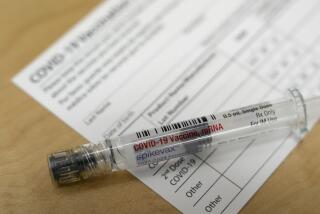Retailers Are Urged to Save Flu Shots for Most Vulnerable
- Share via
At the urging of public health officials, many supermarkets, pharmacies and other retail outlets that provide flu shots are turning away people who are not at the highest risk for serious complications.
The change comes amid a national shortage of the flu vaccine. Officials have called on healthcare providers to give the vaccine only to the elderly, young children, healthcare workers, pregnant women and those with chronic medical conditions.
Retailers offering shots have been deluged over the last three days by people seeking vaccinations, causing long lines at some locations. With the new policy, more people are being turned away at some stores. Customers were being asked to fill out brief questionnaires to see if they adhere to the Centers for Disease Control and Prevention’s criteria for high-risk patients.
But the new screening procedures were not being universally followed.
About two dozen people waited in line for $20 flu shots in front of a Sav-on drug store near Los Angeles City Hall, not all of them in the high-risk group.
Chaoyen Wang, 37, of Arcadia left her law office early Friday afternoon to get vaccinated.
“I know I shouldn’t get it because I’m not over 65,” she said. “But I’m breastfeeding and I don’t want my baby to get sick. I do feel guilty, though. I’m one of those people who always gets a flu shot.”
Private investigator Sarah Carson, 59, said she got her flu shot because she “can’t afford to be down.” She worried that the nurses might prevent her from getting a shot because of the shortage, but counted on her shock of white hair to camouflage her age. “On the Sav-on hotline, they said that they were only taking high-risk individuals,” she said. “But they appear to be taking everybody.”
Dianne Mattingly, a 41-year-old city analyst, is asthmatic and said she was getting shots to avoid a bronchial attack. Mattingly said her doctor had told her that he would not have access to the flu vaccine this year and advised her to go to a private pharmacy.
“As much as I’d like to preserve it for the senior citizens and children,” she said, “I wouldn’t be doing anyone any favors if I get sick.”
The shortage comes after British regulators suspended the license of a pharmaceutical plant in Liverpool because of manufacturing problems and possible contamination. The plant, which makes flu vaccine for Chiron Corp. of Emeryville, Calif., had expected to produce 46 million doses for the U.S. market.
County healthcare agencies, which provide the shots to people who cannot afford to pay, were left with a fraction of their normal supply.
Los Angeles County needs about 130,000 doses but has only 21,000 on hand, with limited prospects of obtaining more.
Many private doctors and pharmacies have received their shipments of the vaccine. That prompted state and county officials Friday to urge those health providers to reserve their supplies for those who need them most.
“From a public-health perspective, we need to do everything we can as a community to make sure the vaccine gets to the people who need it most,” said Michael Mastromonica, assistant general merchandise manager of pharmacy operations for Costco. “It would be unfair, unethical and improper not to.”
Costco was one of nine companies contacted by the Los Angeles County health department Thursday and Friday and asked to give the vaccine only to high-risk patients. Costco, Rite Aid, Walgreen, Albertsons-Sav-on and Vons-Safeway said through spokesmen Friday that they were going to comply with the request.
“We’re getting some level of cooperation,” said Los Angeles County Public Health Director Jonathan Fielding. “I applaud them for doing that. These companies need to be socially responsible.”
Vons, like many other retailers, said it has seen a surge in requests for shots since federal officials announced the shortage Tuesday.
“We have seen very long lines,” said Sandra Calderon, a spokeswoman for Vons. Despite the rationing, however, “we haven’t had any reports of upset customers.”
Fielding has asked healthcare providers with excess vaccine to sell the doses to the county.
Calderon said it was unlikely Vons would have excess vaccine.
Each year in the U.S., more than 200,000 are hospitalized and more than 36,000 die from flu-related illnesses, 95% of them seniors.
More to Read
Sign up for Essential California
The most important California stories and recommendations in your inbox every morning.
You may occasionally receive promotional content from the Los Angeles Times.














